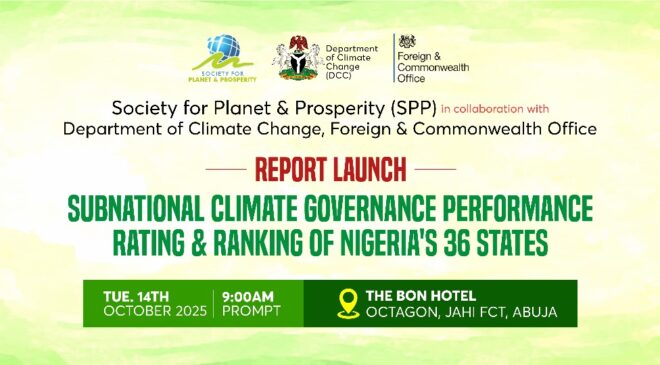
ABUJA/Nigeria: The Society for Planet and Prosperity (SPP), in partnership with the Department of Climate Change (DCC) of the Federal Ministry of Environment, has announced that the second edition of the Subnational Climate Governance Performance Ranking will be released on October 14, 2025 in Abuja.
The ranking, widely known as the Climate Governance Scorecard, evaluates all 36 Nigerian states across five thematic areas: Climate Institutions and Governance, Climate Policy and Action Plan, Climate Project Implementation, Climate Budget and Finance, and Online Visibility.
Ahead of the launch, the Expert Review Panel convened its final session on September 29, 2025 to validate the results and ensure credibility. This year’s process builds on the success of the maiden edition released in 2024 by introducing a Review and Quality Assurance Panel of national and international experts to strengthen transparency, integrity, and accountability.
President of SPP, Prof. Chukwumerije Okereke, said the initiative was already shaping climate action at the subnational level. “The strong cooperation of state governments and the extensive feedback we received from the first edition demonstrate growing political will. I am confident this initiative will continue to elevate the standard of climate governance at the state level,” he stated.
Chairman of the Review Panel, Prof. Chinedum Nwajiuba, described the ranking as a landmark shift from talk to action. “This is the most beautiful thing that has happened to climate change efforts in a long while. It is a shift from roundtable gatherings to practical implementation,” he said, commending the Ministry of Environment and SPP for sustaining the project.
Panel members also stressed inclusivity in climate governance. Dr. Priscilia Achakpa, Global President of the Women Environment Programme (WEP), and Ms. Gbemisola Akosa, Executive Director of C21st, urged recognition of states prioritizing gender in climate policy. Mr. Olumide Idowu, Executive Director of the International Climate Change Development Initiative, called for greater youth integration, stressing that young people “bring innovative ideas and will bear the brunt of climate impacts in the future.”
The maiden edition in 2024 ranked Lagos, Gombe, and Ebonyi as the top three performers, with Borno and Ekiti tied in fourth place. The 2025 process commenced with a national workshop on June 24, bringing together state climate change officers, directors, and focal persons to review the updated methodology.
This year’s ranking enjoys funding support from the UK Foreign, Commonwealth and Development Office (FCDO) through its Partnership for Agile Governance and Climate Engagement (PACE) programme, with initial support provided by the European Climate Foundation (ECF).
The Abuja launch is expected to attract high-level dignitaries, including the Honourable Minister of Environment, members of the Federal Executive Council, state governors, commissioners, NGOs, international partners, and development agencies.
The Expert Review Panel includes respected scholars and practitioners such as Prof. Nwajiuba (Chair), Prof. Olukayode Oladipo, Prof. Daniel Gwary, Dr. Eugene Itua, Mrs. Halima Bawa, Dr. Achakpa, Mr. Idowu, Mr. Amara Nwankpa, Mr. Eghose Omoigui, and Ms. Akosa.
Organisers say the 2025 Scorecard will not only inspire healthy competition among states but also attract partnerships for technical support, capacity building, and accelerate Nigeria’s climate action in line with global commitments under the Paris Agreement.
